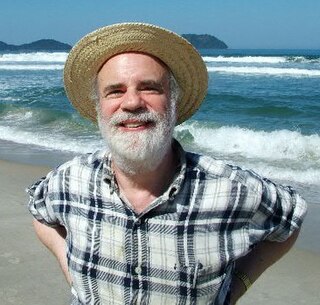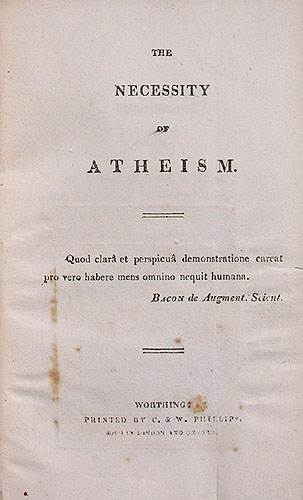Related Research Articles

Saul Aaron Kripke was an American analytic philosopher and logician. He was Distinguished Professor of Philosophy at the Graduate Center of the City University of New York and emeritus professor at Princeton University. Kripke is considered one of the most important philosophers of the latter half of the 20th century. Since the 1960s, he has been a central figure in a number of fields related to mathematical and modal logic, philosophy of language and mathematics, metaphysics, epistemology, and recursion theory.
In logic and mathematics, necessity and sufficiency are terms used to describe a conditional or implicational relationship between two statements. For example, in the conditional statement: "If P then Q", Q is necessary for P, because the truth of Q is guaranteed by the truth of P. Similarly, P is sufficient for Q, because P being true always implies that Q is true, but P not being true does not always imply that Q is not true.

"The Necessity of Atheism" is an essay on atheism by the English poet Percy Bysshe Shelley, printed in 1811 by Charles and William Phillips in Worthing while Shelley was a student at University College, Oxford.
In the criminal law of many nations, necessity may be either a possible justification or an exculpation for breaking the law. Defendants seeking to rely on this defense argue that they should not be held liable for their actions as a crime because their conduct was necessary to prevent some greater harm and when that conduct is not excused under some other more specific provision of law such as self defense. As a matter of political expediency, states usually allow some classes of person to be excused from liability when they are engaged in socially useful functions but intentionally cause injury, loss or damage.

New Confucianism is an intellectual movement of Confucianism that began in the early 20th century in Republican China, and further developed in post-Mao era contemporary China. It primarily developed during the May Fourth Movement. It is deeply influenced by, but not identical with, the neo-Confucianism of the Song and Ming dynasties.

In ancient Greek religion, Ananke, from the common noun ἀνάγκη, "force, constraint, necessity") is the personification of inevitability, compulsion and necessity. She is customarily depicted as holding a spindle. One of the Greek primordial deities, the births of Ananke and her brother and consort, Chronos, were thought to mark the division between the eon of Chaos and the beginning of the cosmos. Ananke is considered the most powerful dictator of fate and circumstance. Mortals and gods alike respected her power and paid her homage. Sometimes considered the mother of the Fates, she is thought to be the only being to influence their decisions. According to Daniel Schowalter and Steven Friesen, she and the Fates "are all sufficiently tied to early Greek mythology to make their Greek origins likely."

Jacques Lucien Monod was a French biochemist who won the Nobel Prize in Physiology or Medicine in 1965, sharing it with François Jacob and André Lwoff "for their discoveries concerning genetic control of enzyme and virus synthesis".
In philosophy, metaphysical necessity, sometimes called broad logical necessity, is one of many different kinds of necessity, which sits between logical necessity and nomological necessity, in the sense that logical necessity entails metaphysical necessity, but not vice versa, and metaphysical necessity entails physical necessity, but not vice versa. A proposition is said to be necessary if it could not have failed to be the case. Nomological necessity is necessity according to the laws of physics and logical necessity is necessity according to the laws of logic, while metaphysical necessities are necessary in the sense that the world could not possibly have been otherwise. What facts are metaphysically necessary, and on what basis we might view certain facts as metaphysically but not logically necessary are subjects of substantial discussion in contemporary philosophy.

The Declaration of the Causes and Necessity of Taking Up Arms was a Resolution adopted by the Second Continental Congress on July 6, 1775, which explains why the Thirteen Colonies had taken up arms in what had become the American Revolutionary War. The Declaration was written by Thomas Jefferson and revised by John Dickinson.

Francis Turretin was a Genevan-Italian Reformed scholastic theologian.

The Battle of Fort Necessity, also known as the Battle of the Great Meadows, took place on July 3, 1754, in what is now Farmington in Fayette County, Pennsylvania. The engagement, along with the May 28 skirmish known as the Battle of Jumonville Glen, was George Washington's first military experience. The Battle of Fort Necessity began the French and Indian War, which later spiraled into the global conflict known as the Seven Years' War. Washington built Fort Necessity on an alpine meadow west of the summit of a pass through the Laurel Highlands of the Allegheny Mountains. Another pass nearby leads to Confluence, Pennsylvania; to the west, Nemacolin's Trail begins its descent to Uniontown, Pennsylvania, and other parts of Fayette County along the relatively low altitudes of the Allegheny Plateau.

Fort Necessity National Battlefield is a National Battlefield in Fayette County, Pennsylvania, United States, which preserves the site of the Battle of Fort Necessity. The battle, which took place on July 3, 1754, was an early battle of the French and Indian War, and resulted in the surrender of British colonial forces under Colonel George Washington, to the French and Indians, under Louis Coulon de Villiers.
In tort common law, the defense of necessity gives the state or an individual a privilege to take or use the property of another. A defendant typically invokes the defense of necessity only against the intentional torts of trespass to chattels, trespass to land, or conversion. The Latin phrase from common law is necessitas inducit privilegium quod jura privata. A court will grant this privilege to a trespasser when the risk of harm to an individual or society is apparently and reasonably greater than the harm to the property. Unlike the privilege of self-defense, those who are harmed by individuals invoking the necessity privilege are usually free from any wrongdoing. Generally, an individual invoking this privilege is obligated to pay any actual damages caused in the use of the property but not punitive or nominal damages.
A fallacy of necessity is a fallacy in the logic of a syllogism whereby a degree of unwarranted necessity is placed in the conclusion.
In English law, the defence of necessity recognizes that there may be situations of such overwhelming urgency that a person must be allowed to respond by breaking the law. There have been very few cases in which the defence of necessity has succeeded, and in general terms there are very few situations where such a defence could even be applicable. The defining feature of such a defence is that the situation is not caused by another person and that the accused was in genuine risk of immediate harm or danger.
A priori and a posteriori are Latin phrases used in philosophy to distinguish types of knowledge, justification, or argument by their reliance on empirical evidence or experience. A priori knowledge is independent from current experience. Examples include mathematics, tautologies, and deduction from pure reason. A posteriori knowledge depends on empirical evidence. Examples include most fields of science and aspects of personal knowledge.
Military necessity, along with distinction, and proportionality, are three important principles of international humanitarian law governing the legal use of force in an armed conflict.
The doctrine of necessity is the basis on which extraordinary actions by administrative authority, which are designed to restore order or uphold fundamental constitutional principles, are considered to be lawful even if such an action contravenes established constitution, laws, norms, or conventions. The maxim on which the doctrine is based originated in the writings of the medieval jurist Henry de Bracton, and similar justifications for this kind of extra-legal action have been advanced by more recent legal authorities, including William Blackstone.
An easement is a nonpossessory right to use and/or enter onto the real property of another without possessing it. It is "best typified in the right of way which one landowner, A, may enjoy over the land of another, B". An easement is a property right and type of incorporeal property in itself at common law in most jurisdictions.
Bare Necessities is an American lingerie, swimwear, and loungewear online retailer which was established in 1998 in Avenel, New Jersey. The company claims to be the second largest online retailer in the industry next to Victoria's Secret with over $66 million in revenues.